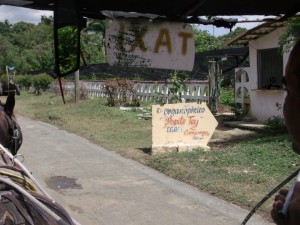Cooperativism and Cuba: A Primer
May 4, 2012 by admin
“Revolution in Retreat” proclaimed the Economist on the cover of it’s March 22nd issue. It predicted that, while the massive economic changes that Cuba was undergoing today were a good start, they were also proof that the island nation has a long way to go in order to insert itself into the global economy and deliver prosperity to all its citizens. However, we Cuba must also make sure that the promises of its revolution are kept. If it were to fall to a position that Haiti or the Dominican Republic has, it would be political unsalient and the people would move back to the undemocratic dictatorship it has at current. As such, the Cuban government has to walk a delicate balance between having the freedoms the Economist espouses and reverting back to a US-dominated feudal economy that would happen were Cuba were to “open up” its markets completely.
A second revolution is also happening in Cuba at the same time. All throughout the country, organic farms are cropping up. Like anything else, this is not happening without government support. Still, the UBPCs (Unidad Básicas de Producción Cubana, Units of Basic Cuban Production) are an important part in ensuring that the Cuban government, and by extension populace, move beyond the old Soviet-era methods of state controlled production and into cooperative production, allowing globalization to happen within a socialist context. UBPCs are organic farming cooperatives led by the government which produce food for local consumption. They are managed and worked on by ordinary Cubans, who take home a share of the profits from these organic farms. Started during the Special Period in order to take care of the urgent food situation, UBPCs have transitioned into the cornerstone of reform in the countryside as well as a path to globalization which doesn’t threaten the revolution.
UBPCs provide abundance while keeping with socialist goals
While they have been referred to as “Neither Eden nor Wasteland” by the website Southern Spaces, UBPCs provide a lot more benefits than obstacles in terms of development which doesn’t increase inequality in Cuba. The main benefits that the Organic cooperatives give to Cuba are that they incentivize production for citizens by allowing them to make more money through market mechanisms, but in a way which does not create a landowning class, while at the same time promoting sustainable agriculture and taking care of food security. The collective nature of UBPCs not only ensures that profits are split evenly and that the farm will not switch into industrial farming, but also gives Cubans a taste of democracy, as leadership is generally elected within the cooperative. Even if Cubans cannot elect their national leadership, they are much more in control of their economic situation. UBPCs can be found in either urban or rural locales, meaning that the whole island has access to this method of growing food giving food security to the cities and economic security to the countryside
Organic Farms of all sorts litter the countryside
The future of UBPCs seem pretty certain. While profitabilty varies wildly from year to year and crop to crop, UBPCs are consistently more productive than state enterprises or small private farms. Given that a move to private industrial farming would likely be a move into soy (or even worse, back to sugar), UBPCs are also ensure that Cuba has food security, which is important for any small island nation. And the cooperative model can be moved into the industrial, finance, and other service sectors, as experiences throughout Latin America and with the Mondragon Corporation, something the Cuban government is eager to do. However, the Cuban government still exercises great control over the UBPCs, overseeing their construction and funding them. The government needs to find ways in which it can make UBPC creation and maintenance more controlled by the people themselves, either through mortgage banking or through other means. In this way, they can more fully use the market functions of cooperativism and create take steps towards democratic governance.
Leave a Reply
You must be logged in to post a comment.

